The Killingseeders: 5
leechers: 1
The Killing (Size: 963.05 MB)
Description
Stanley Kubrick - The Killing (1956)
http://www.imdb.com/title/tt0049406  http://i168.photobucket.com/albums/u200/LL_KG/killing2.jpg" /> http://i168.photobucket.com/albums/u200/LL_KG/killing2.jpg" />The Killing was director Stanley Kubrick's first major film effort -- though, like Kubrick's earlier films, it was economically produced with an inexpensive cast. In a variation of his Asphalt Jungle role, Sterling Hayden plays veteran criminal Johnny Clay, planning one last big heist before settling down to a respectable marriage with Fay (Colleen Gray). Teaming with several cohorts, Johnny masterminds a racetrack robbery. All the crooks involved are losers and small-timers who find themselves in way over their heads despite their supposed cleverness. None of the participants is more pathetic than George Peatty (Elisha Cook Jr.), who is goaded into the robbery by his covetous and far-from-faithful wife (Marie Windsor). Prominently featured in the cast of The Killing are offbeat character actors Tim Carey and Joe Turkel, who'd show up with equally showy roles in future Kubrick productions. The Killing is based on the novel Clean Break by Lionel White. 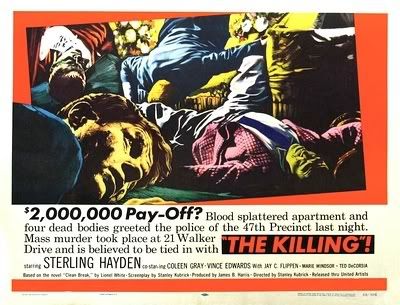 REVIEWS All Movie Guide Stanley Kubrick's third feature showed that he was no ordinary director, as he dispensed with traditional time structure to detail the planning and execution of a racetrack heist gone wrong. Combining a non-linear story with a unifying, matter-of-fact voice-over narration, Kubrick constructed an intricate yet lucid cinematic puzzle that shifted back and forth both in time and among the central characters, revealing the personal stakes for each participant by following their individual actions leading up to the fateful seventh race. Johnny the leader thinks he has it all under control, but, in true Kubrick fashion, his plan is not immune to human failure. While the fractured time frame and use of long takes and tracking shots signaled Kubrick's stylistic break from classical form, the sharp black-and-white photography, Marie Windsor's insidious femme fatale, and Sterling Hayden's doomed Johnny place The Killing in the mode of 1940s/1950s film noir. His first film made on a reasonable budget and with an established cast of pros, The Killing caught critics' attention and established Kubrick as a director to watch, especially for such future cinematic time-tricksters as Quentin Tarantino. Time Out Film Guide Characteristically Kubrick in both its mechanistic coldness and its vision of human endeavour undone by greed and deceit, this noir-ish heist movie is nevertheless far more satisfying than most of his later work, due both to a lack of bombastic pretensions and to the style fitting the subject matter. Hayden is his usual admirable self as the ex-con who gathers together a gallery of small-timers to rob a race-track; for once it's not the robbery itself that goes wrong, but the aftermath. What is remarkable about the movie, besides the excellent performances of an archetypal noir cast and Lucien Ballard's steely photography, is the time structure, employing a complex series of flashbacks both to introduce and explain characters and to create a synchronous view of simultaneous events. Kubrick's essentially heartless, beady-eyed observation of human foibles lacks the dimension of the genre's classics, but the likes of Windsor, Carey and Cook more than compensate. (From the novel Clean Break by Lional White. noiroftheweek.blogspot.com My original NOTW plan for this week was to lift the curtain on a Sterling Hayden heist double feature, coupling The Killing with The Asphalt Jungle, but I decided that it would be a bit hoggy to grab two certified classics in one swoop. Hence, I’m going with what I feel is the slightly better of the two films, even if Hayden’s Johnny Clay is a far less noble and likable character than his Dix Handley from ``Jungle.’’ In fact, all the characters in The Killing are fairly cold and unlovable – the bartender with his ill wife excepted – as compared to those in The Asphalt Jungle. But that makes it an even darker film and a more compelling noir, at least from this view. Video thumbnail. Click to play Click to play trailer The debate between The Killing and Jungle, is a worthy one – in our all-time noir poll, John Huston’s Jungle finished 4th and Stanley Kubrick’s The Killing 10th. Checking back on my own ratings, I had The Killing 7th and The Asphalt Jungle 10th. No doubt, it’s close. The inexorable link between the two films is Hayden, who enjoyed two of his best roles with these distinctly different caper films (only his General Jack D. Ripper in Dr. Strangelove tops them). The Killing is Kubrick’s only fully realized noir and a decidedly mature effort for someone making just his second full feature at the tender age of 27. I haven’t read many Kubrick interviews on his influences but I’d be very surprised if the great noir directors of the late 40s and early 50s didn’t make a dramatic impression on him technically and stylistically. Even his non-noir films such as Lolita, Path of Glory and Dr. Strangelove are shot with in distinct, shadowy noir tones. Moreover, in selecting his cast for The Killing, it was if Kubrick decided to field an all-star team of players from his favorite noir films – Hayden, Elisha Cook, Marie Windsor, Ted de Corsia, Coleen Gray, Jay C. Flippen, Joe Sawyer and Vince Edwards. To that group, he adds his own noir prodigy, the astounding and truly frightening Tim Carey as puppy-loving psychopath Nikki Arcane. To my mind, The Killing rates a narrow edge over The Asphalt Jungle for two reasons: 1) the sheer ingeniousness of the race-track heist itself and its Mission Impossible-like execution, and 2) Kubrick’s non-linear telling of the tale through overlapping vignettes of the myriad characters, a direct draw from the Lionel White’s novel but nonetheless a fresh cinematic twist on noir storytelling. The Killing is a jigsaw puzzle of a film that all comes together in a fascinating climax. Unlike Jungle’s Dix Handley, Johnny Clay doesn’t wind up dead but sounds like he wishes he were when he says, ``Ah, what’s the difference?’’ in the final scene. He knows he’s headed back to Alcatraz after his plan – successfully executed -- ultimately fails on the subsequent flukes of fortune of Sherry Peatty’s greed and infidelity, George Peatty’s jealousy and … well, Johnny's inability to buy a decent suitcase despite making a $2 million haul. The interplay between Windsor and Cook as husband and wife is delicious entertainment. It’s a crack-up every time she informs poor George that dinner is still down at the store. She’s a femme fatale of the first order, someone who’s definitely been around the block of times. A past liaison with Johnny Clay is at least hinted at the point she is caught spying on the gang and Johnny declares he’s going to pound her face into hamburger. All the other character players are terrific as well. De Corsia is the classic sleazy cop; what a sensational scene when he blithely drives away from the woman who is initially happy she’s found a policeman to break up a domestic dispute. Kola Kwarian the wrestler seems a nod to Night and The City and is expertly played by Maurice Oboukhoff. But the scene-stealer is Carey, more chilling than Norman Bates and significantly more menacing. The Asphalt Jungle had nothing like Nikki, for sure. Kubrick makes winning collaborations in The Killing with co-screenwriter Jim Thompson and cinematographer Lucien Ballard. My only problem with the film is its shrill score by Gerald Fried. I can only imagine this film scored by someone like Bernard Herrmann or Roy Webb. But that’s not enough to hold back The Killing from greatness. It’s one of those noirs you can watch over and over again and uncover fresh revelations in each viewing. It comes late in the classic cycle, even post-dating the apocalyptic Kiss Me Deadly, but the film has nonetheless become a pillar of the genre, whether it’s truly a superior film to The Asphalt Jungle or not. The reason is Kubrick, who created a valentine to the genre and also added something new – an even more dark and demented depth of spirit that portended the neo-noirs of the 1960s and 1970s, as well as films like Pulp Fiction in the 1990s. It belongs in every noir library on the top shelf. 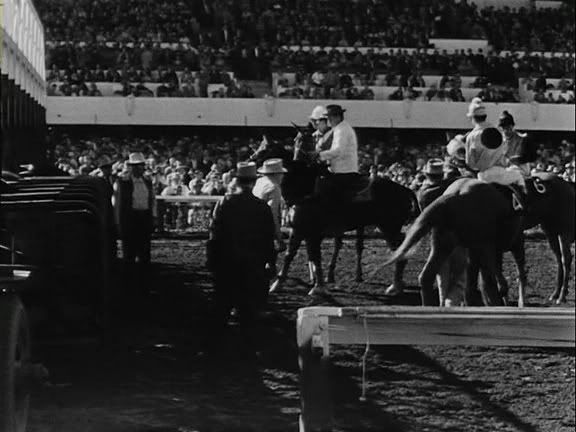 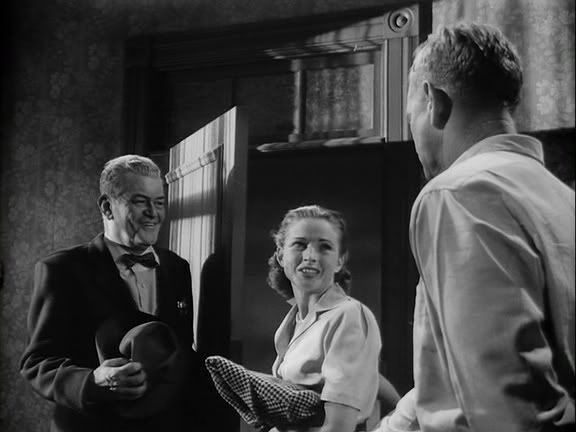 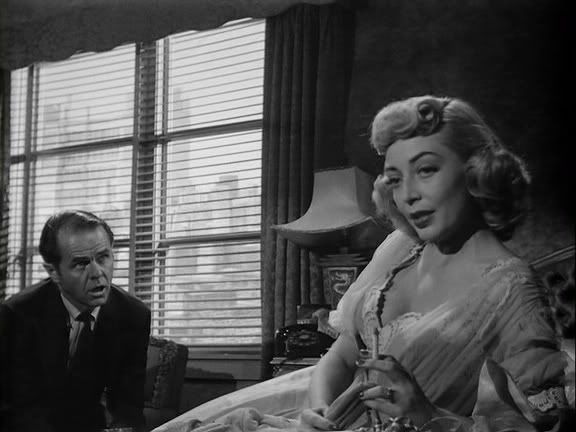 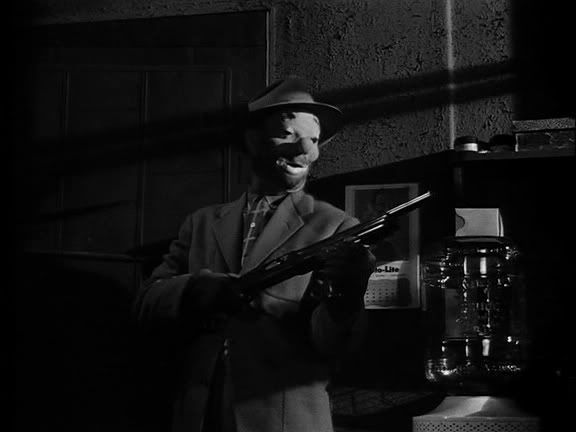 ----------not my rip------- File Size (in bytes) ..........................: 1,009,833,984 bytes Runtime ............................................: 1:20:52 Video Codec ...................................: XviD 1.1.2 Final Frame Size ......................................: 576x432 (AR: 1.333) FPS ..................................................: 25.000 Video Bitrate ...................................: 1565 kb/s Bits per Pixel ...................................: 0.252 bpp B-VOP, N-VOP, QPel, GMC.............: [B-VOP], [], [], [] Audio Codec ...................................: 0x0055 MPEG-1 Layer 3 Sample Rate ....................................: 48000 Hz Audio Bitrate ...................................: 104 kb/s [1 channel(s)] VBR Interleave (in ms).............................: 40 Preload (in ms).................................: 480 Split/Aligned Across Interleaves.....: Aligned No. of audio streams .......................: 1 ************************************** Freakyflicks is a free and open community dedicated to preserving and sharing cinematic art in the digital era. Our goal is to disseminate such works of art to the widest audience possible through the channels provided by P2P technology. The Freakyflicks collection is limited to those films that have played an exceptional role in the history of cinema and its progression in becoming a great art. Films that are usually described as classic, cult, arthouse and avant-garde. If you have films that fit this description feel free to share them and participate in our community. All you need do is include this tag in your upload and join us at the forum to announce your release. https://board.freakyflicks.org/index.php 'If we all seed just 1:1, give at least what we take, this torrent will NEVER DIE Related Torrents
Sharing Widget |
